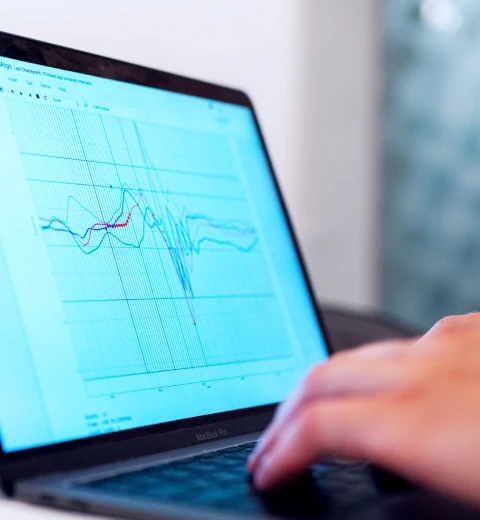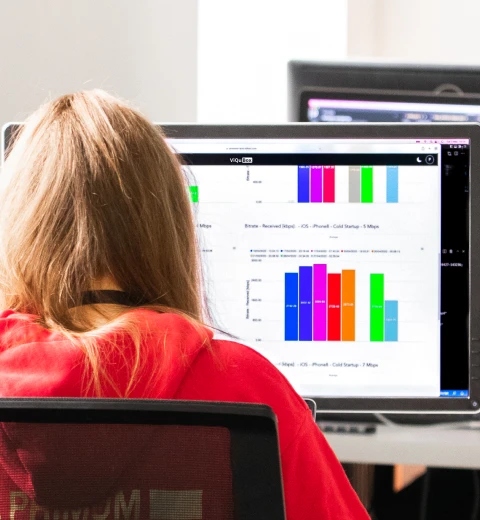Video quality testing
Whether it is VoIP, WebRTC video call, or a media broadcast service, you should know how the media quality of your solution changes under different network conditions and device configurations. Such videos usually are tested manually and checked by simply looking at them. Our solution for media testing automatically deconstructs video into frames and evaluates video quality based on multiple objective characteristics. You will get an insight of the product’s state as well as how it compares to competition.


VQTDL
IQA revolution
Introducing VQTDL, a revolutionary video quality assessment algorithm developed by TestDevLab. This no-reference tool uses deep learning to deliver image quality predictions that closely mimic human perception, even in challenging conditions such as varying network connections, platforms, and applications.
Stable and predictable results
VQTDL uses deep learning techniques such as RESNET50 and Transformer-CNN architecture to accurately process and analyze video data, giving consistent and reliable results. VQTDL is also capable of handling images of any resolution, which enhances its stability even further.
Optimized for automated environments
VQTDL's combination of reliability, stability, and automation compatibility make it an ideal choice for video quality assessment in automated environments. Its ability to accurately assess video quality will help you optimize your processes and enhance efficiency, ultimately delivering value to your application.
ViQuBox
ViQuBox is a SAAS tool used to process video, audio, and network test data in order to produce reliable results for audio and video testing metrics, such as VQTDL, VMAF, POLQA, VISQOL, PSNR, SSIM, FPS, Freezes, Delays and more.


Virtual Background
Virtual backgrounds are a great feature, but lighting conditions, accessories, and camera properties can affect their performance, which can lead to a bad user experience. Our virtual background performance evaluation algorithm will provide a precision score over time, indicating how well the video is cropped.
Network conditioning
We can emulate various network conditions to create real-world network scenarios like low bandwidth, high latency, or jitter.
Jitter
Jitter is defined as a variation in the delay of received packets. Due to network congestion, improper queuing or configuration errors, a steady stream can become lumpy or the delay between each packet can vary instead of remaining constant. We can set custom Jitter configurations.
Packet loss
Packet loss occurs when one or more packets of data travelling across a computer network fail to reach their destination. Packet loss is either caused by errors in data transmission, typically across wireless networks, or network congestion. We can set any packet-loss scenarios.
Network conditions / speed
We can set any network bandwidth — the rate of data transfer, ranging from very low network bandwidth to almost unlimited network bandwidth.
Network switches/changes
Within our laboratory we can emulate network interruptions, changes between 3G, 4G, and Wi-Fi, re-connection scenarios, and other real-world scenarios, so application developers can better understand how their product behaves
Setup
We have created a dedicated video testing laboratory that includes:
Dedicated treated room with controlled environment for tests with constant brightness
Custom network routers that allow us to change various network configurations ( bandwidth limitation, packet loss, delay and all combinations of those parameters to simulate network across the Globe)
Tools to capture video either from desktop or mobile devices
Specific software and hardware setup for post-processing and analysing the results
Reports
Using various objective video quality metrics and representing them in understandable reports, we can help application developers understand the quality of their video product, how it compares to competitors, the changes in its quality under different network conditions and other use cases.
BRISQUE
Time (s)
Test 1
Test 2
Test 3
BRISQUE
BRISQUE is Blind/Referenceless Image Spatial Quality Evaluator, which helps us determine video quality score in range from 0-5
Milliseconds (ms)
Time (s)
Test 1
Test 2
Test 3
Audio & Video delay
Audio video delay shows real Audio / Video sync delay represented in seconds
Frames per second
Time (s)
Test 1
Test 2
Test 3
Frames per second
By embedding specific markers within each frame of the video, we can calculate real FPS metric
Resolution (p)
Time (s)
Test 1
Test 2
Test 3
Resolution
By embedding specific resolution markers within video, we can calculate actual resolution and how much compression and network quality affects actual video quality.
VMAF
Time (s)
VMAF 1
VMAF 2
VMAF 3
Full reference video quality assessment
VMAF – a recent addition to the perceptual video quality assessment algorithm family, developed by Netflix, quickly becoming an industry standard. It incorporates several elementary metrics with different weighting.
Freeze duration (s)
Freeze start (s)
Test 1
Test 2
Test 3
Freeze & Stall
QoE metric. Happens when video stops but audio still carries on. Usually seen for short amount of time, but still visible for the user.
We provide also custom-made video quality assessment metrics
Sometimes our clients require a specific video quality testing solution such as continuous video quality monitoring that is implemented within Client's CI (Continuous Integrations systems) or adding some custom quality markers. We're open to discuss and implement also such custom-made video quality assessment solutions.
